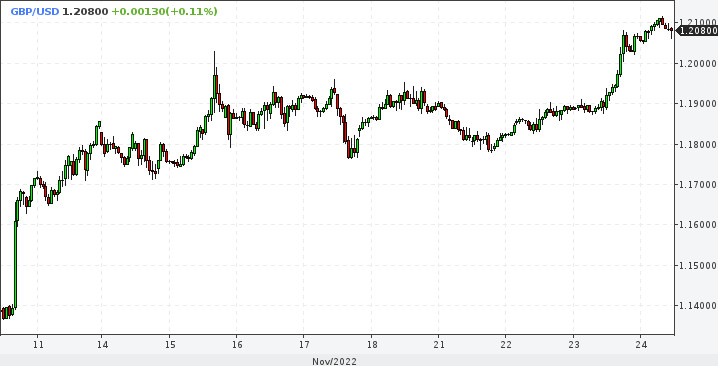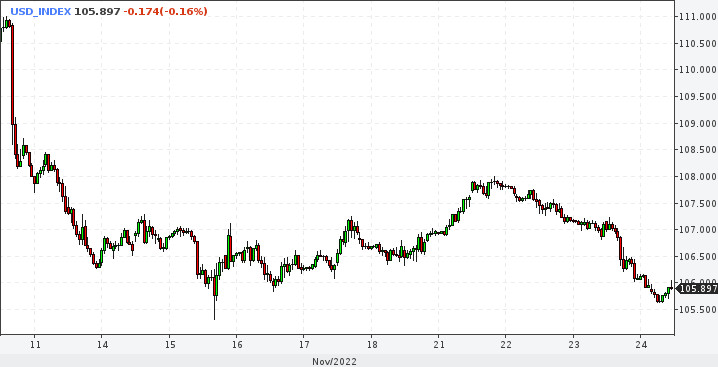Next week, the trajectory of some pairs may change dramatically. The US dollar is also expected to resume an upward movement. If so, it will increase pressure on its rivals. Fed policymakers could also provide more comments on future plans for monetary policy. Some Fed members could even speak in favor of the fifth consecutive rate increase by 75 basis points at the December meeting.
Yesterday, the pound sterling rose above 1.2000 for the first time since August. Such a sharp increase occurred amid the falling US dollar before Thanksgiving Day and fundamental factors. As trading floors in the US are closed, the pound sterling will be able to climb higher in the coming sessions.
Why has the pound sterling started steady growth? Is there a likelihood of a rise in the greenback next week?
GBP maintains bull run
The British currency jumped against the US dollar, the euro, and other major currencies on Wednesday and Thursday, following the news about a surge in the UK's government debt.
The GBP/USD pair was trading around a high of 1.2110.
Falling government bond yields are signaling confidence in the improving economic conditions in the UK.
As a reminder, Treasury yields grew considerably after the announcement of the September mini-budget of former Prime Minister Liz Truss. Investors demanded higher interest premiums to purchase UK debt.
Following a jump in government bond yields, the cost of borrowing increased drastically. It led to the destabilization of the UK financial sector and worsened the economic downturn. The pound sterling reacted with a nosedive.
The current decline in Treasury yields indicates an improvement in the UK's economic prospects.
The GBP/USD pair grew by 16% after the political woes in late September.

After several months of volatility and lows, the pound sterling may finally recover. Naturally, not all problems have disappeared completely but it is easier to assess risks at the current levels, analysts HSBC pointed out.
In their latest forecast, they predicted a rally during 2023.
As for growth yesterday, it was facilitated by some internal factors. The economic reports turned out to be better than expected. The PMI Indices for November increased after a long time of contraction.
There is no denying that the country is in a recession but traders are well aware of it. Therefore, the market reaction is likely to be quite strong to positive reports. In other words, traders will pay more attention to upbeat reports, ignoring bad ones.
Besides, traders are no longer concerned about another bearish factor that has been weighing on the British currency for some time. The UK Supreme Court ruled that the Scottish government cannot hold a referendum for independence without the UK government's approval.
This news also supported the pound sterling today.
USD not ready to give up
On Wednesday, the greenback saw a big sell-off. It dropped lower after the release of the economic reports. The Manufacturing PMI Index slid below 50. The labor market seems to be losing steam as well. Analysts were not surprised.
Economists at Pantheon Macroeconomics believe that the number of initial jobless claims has been gradually rising for some time as firms are facing challenges due to the Fed's aggressive tightening.
The Manufacturing and Services PMI Indices fell at the fastest pace since August and the 2008 financial crisis. Recessions in both sectors have become deeper.
Meanwhile, new home sales soared by 632,000 in October after a downwardly revised figure of 588,000. It was the first increase in three months. The US dollar managed to recover slightly amid this report. However, this data is quite controversial given a decrease in mortgage demand.
The University of Michigan's inflation expectations has declined this month. The Fed is sure to take notice of this survey. The greenback may start a short-term rally.

As seen, the US economic reports are rather controversial. It is hard to get a clear picture of the economic situation.
ING economists are concerned that a 7% fall in the US dollar against its rivals and a drop in the 10-year government bond yield has led to a significant weakening of financial conditions. The result is the exact opposite of what the central bank is trying to achieve.
It would not be surprising if the Fed's rhetoric becomes even more hawkish next week.
One year ahead inflation expectations decreased to 4.9% from 5%. At the same time, the figures remain at a level more than twice exceeding the Fed's target of 2%. Five years ahead inflation expectations also remained above the target.
Inflation expectations will hardly force the Fed to change its hawkish stance. Investors may again abandon their expatiations of a softer stance next week after studying the November meeting minutes and returning to the market after the holiday.
Traders are likely to pay attention to how many Fed policymakers are backing further aggressive tightening. At the press conference, Fed Chair Jerome Powell said that officials could raise interest rates even higher than 4.5-4.75% than initially projected in September.